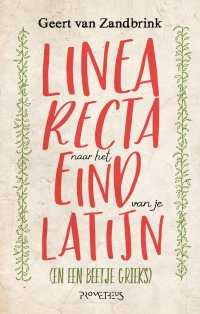Text Luuk Zegers photo Sven Menschel
Audaces fortuna iuvat (‘Fortune rewards the bold’)
Writing a book about the roots of Dutch words in classical languages: not quite what you expect from a first-year student of Economics and Policy at WUR. But that is what Geert van Zandbrink has done (see inset). ‘It started during everyday conversations. I would hear a word and think: that’s where that comes from. And so I started to trace more and more Dutch words back to their Greek or Latin origins.’ He decided to keep records of his linguistic discoveries in an ever-expanding text file.
Van Zandbrink’s love of the classical languages started at Bernrode gymnasium, (an academic high school) in Heeswijk-Dinther. ‘I had the time of my life there: I was on the school council, I acted in school musicals and did things for charity. That the way to make your school your own.’ He got good grades, especially in Greek and Latin, and continued with both languages to exam level. ‘It just so happened that I was taught both subjects by the same teacher, who was also my mentor. I got 10 out of my 30 lessons a week from him. That creates a bond.’
Radio school
In spite of having felt so at home in High School, Van Zandbrink couldn’t settle at all at University College Maastricht when he started there in 2017. His studies took up a lot of time, whereas he wanted to do other nice things as well, and there wasn’t much of a click with his fellow students. After two months he decided to drop out and see the year as a gap year. ‘I did all sorts of things: I worked in a supermarket, helped out on a farm, did exam coaching and gave extra lessons in Greek and Latin. Through a friend I also got involved in the Radio School, a broadcasting course run by the broadcaster KRO-NCRV.’
Van Zandbrink learned the art of broadcasting in a group of young enthusiasts. ‘The main thing I learned there was to be cheeky. If you really want to talk to someone and you only have his emergency telephone number, you just ring that number, even if it’s not an emergency. It pays to be bold.’
Marathon
It was at the Radio School, too, that Van Zandbrink was inspired to write a book based on his file full of linguistic information. ‘When we were doing an item about the marathon in New York, I talked about where the word marathon comes from. During the First Persian War, the Greeks defeated the Persians in the Battle of Marathon. A Greek messenger ran all the way from the battlefield to Athens to report that the Persians had been defeated. That was just over 42 kilometres. As soon as he had delivered his message, he dropped dead.’
The editors were so enthusiastic that Van Zandbrink grabbed his laptop and started reading aloud from his word list. ‘Afterwards my supervisor took me aside and said: “Geert, you really should do something with this. You have a good story that you can tell very nicely, and you have media experience, which interests publishers. You’ve just got to be bold and approach people.’
Studies on hold
The message did not fall on deaf ears. Van Zandbrink got in touch with Prometheus publishing house and with Paulien Cornelisse, author of an entertaining book about language trends, Taal is zeg maar echt mijn ding. Cornelisse sent him some tips about how to write a book, and Prometheus asked him to turn his pitch into sample chapters. Van Zandbrink wrote five chapters and was promptly invited for a discussion. ‘That was really cool. Prometheus is in a gorgeous building on the Herengracht in Amsterdam. We had a chat about the book in a very posh room.’ A successful talk, too, because the magical moment in the back garden of Van Zandbrink’s student house in Wageningen followed a couple of weeks later: he signed his first publishing contract.
The rest of the book still had to be written, however, and meanwhile Van Zandbrink had just started on a Wageningen degree programme. As soon as he had enough study credits to get into the second year, he decided to put his studies on hold and devote himself entirely to his writing debut. ‘I don’t feel guilty about that. It’s not a bad thing to drop a few courses to do something you love doing. But this academic year and am going to get study credits.’
Forum
Van Zandbrink eventually wrote all 40 chapters of his book Linea recta sitting at his laptop in the Forum. He asked his former high school teacher and mentor to check it for academic accuracy. That was a very nice reunion. ‘I write with a pinch of salt: it’s got to be fun to read. He sees it the same way. And he thought it was great that I was still working on the classical languages two years after my exams.’

‘A book about everything that makes Latin and Greek such fun’
Linea recta naar het eind van je Latijn (en een beetje Grieks), by WUR student Geert van Zandbrink, will be in the bookshops from 25 September. The light-hearted language book is about the roots of Dutch words in Roman and Greek culture and mythology. ‘I wanted to write a book that covers everything that makes Latin and Greek such fun,’ says Van Zandbrink, who wrote the book in the Forum. ‘The WUR campus has lots of references to mythology: Atlas, Forum, Orion.’ Those terms didn’t get into the book, but the word ‘campus’ did. ‘That is Latin for open plain or field. The word kamperen (camp) is derived from it: you do that on an open field. And politicians who go on a campagne (campaign) go out into the field to win votes.’
